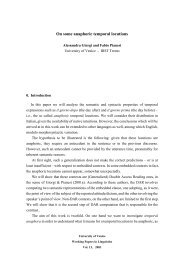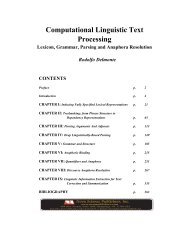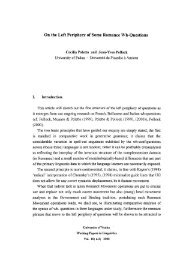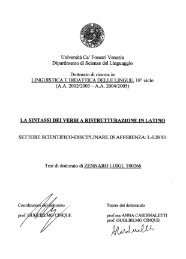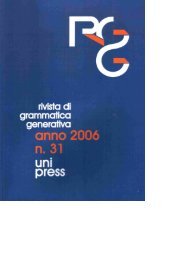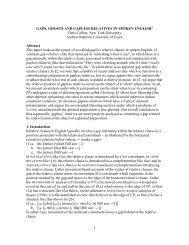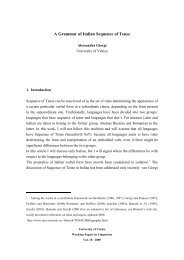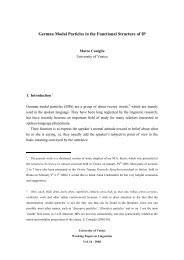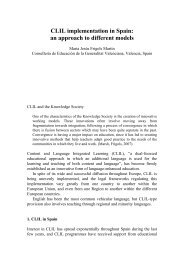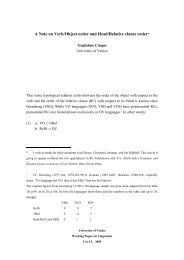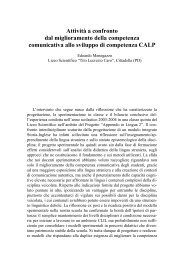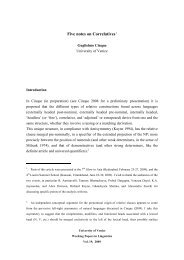Earliness Principle - Lear
Earliness Principle - Lear
Earliness Principle - Lear
Create successful ePaper yourself
Turn your PDF publications into a flip-book with our unique Google optimized e-Paper software.
-6-<br />
2.1 Argument #1 for the Innertness of do: __ Conditional Inversion (C-Inv)<br />
English, like a number of Germanic and Romance languages, shows a type of<br />
subject-verb inversion in conditionals. The complementary distribution of Conditional Inversion<br />
(C-Inv) and lexical if, _ seen in (15), suggests, as noted by den Besten (1983) and Holmberg (1986),<br />
that the Conditional Inversion crucially involves COMP. Let us therefore assume, with these<br />
authors, that C-Inv is a rule that moves the contents of INFL to C.<br />
(15) a. If John had read the book, he would have known the answer.<br />
b. Had John read the book, he would have known the answer.<br />
c. *If had John read the book, he would have known the answer.<br />
d. *Had if John read the book, he would have known the answer.<br />
W ewill show that do __does<br />
not undergo this rule, and use this fact to argue for<br />
LP-structure. T o accord any significance to this fact, however, it is first necessary to look at what<br />
elements of the verbal and auxiliary systems may ____ undergo this rule. 6<br />
In English, C-Inv applies only to counterfactuals. ____________ Thus, whenever C-Inv is found, the<br />
protasis is always presupposed to be false (or unlikely). I will use the ability to take an apodasis<br />
with the modal would _____ as a sign that a conditional is counterfactual, which seems correct.<br />
2.1.1 Non-inverted ________________________<br />
Counterfactuals<br />
Before asking what elements can occur in counterfactuals with ____________ inversion, we must ask<br />
what elements can occur in the INFL of the protasis of counterfactuals without ______ inversion. A<br />
complete listing can be found in (16), where (16a-g) contain auxiliaries and modals that do occur in<br />
non-inverted counterfactuals, and (16h-o) contains those modals that do not occur in<br />
counterfactuals.<br />
(16) a. If John had solved the problem, he would have shown up.<br />
b. If Mary should meet him, she would certainly come and<br />
tell us. [“non-obligational ______ should”]<br />
c. If John were to solve the problem, we would be happy.<br />
d. If Mary were dying, she would look worse.<br />
e. If Mary could speak French, she would have shown up.<br />
f. ?If we were to take out the garbage every day, they would<br />
have left us a note.<br />
(on the reading “if we were to” ≈“If we were expected to”)<br />
g. If John would drive a little faster, he would get there a<br />
little sooner. [“agentive _____ would”]<br />
h. *If Mary can speak French, she would have translated for us.<br />
i. *If Bill may leave, we would have been told.<br />
j. *If Bill might leave, Sue would have informed us.<br />
k. *If Sue must take out the garbage each morning, she would have<br />
asked for higher wages. [cf. (93f)]<br />
l. *If Bill ought to take out the garbage each morning, Sue would<br />
have informed us.<br />
m. *If Mary shall speak French, she would have started already.<br />
n. *If Bill should take out the garbage, we would have known about it.<br />
[“obligational ______ should”]<br />
o. *If Sue will speak French, she would have told us.<br />
(17) shows that paraphrases of many of the bad modals in (16) are acceptable. We<br />
therefore can’t look to their meaning for a simple answer:



